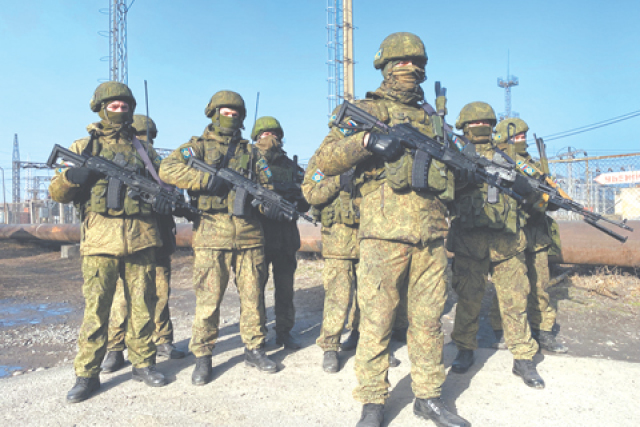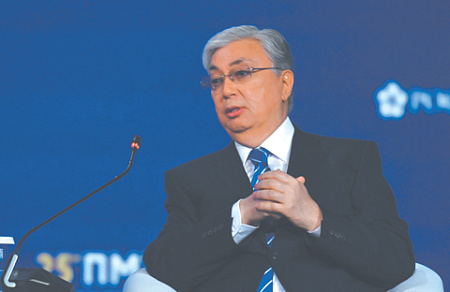Can the West introduce an interethnic split into Russian society
If we take jobs as a starting point, then at least 6 million natives of Central Asia can be in Russia at the same time. All figures are given without taking into account covid, seasonal and other fluctuations characteristic of our migration services.
Much of what we know about migrant workers is at the junction of our ignorance, Central Asian unfounded and periodically escalating phobias generated by rumors. The reality is that after 1991, we know no more about Central Asia than we do about cousins: either nothing or a lie.
Our Asian neighbors, generally speaking, have not distanced themselves. On the contrary: there are more of them on our streets than under the Union. The general problem is that the sovereignization of Central Asia has not led to the formation of self-sufficient states there, primarily their social institutions.
There are no exceptions here. Even the reputation of Kazakhstan as the most prosperous state in the region did not save this country from the January events. Their repetition is not excluded either in Kazakhstan or its neighbors. This also applies to Uzbekistan, despite its stated improvement in the employment situation. However, this thesis is confirmed mainly by postcard views of Tashkent construction sites.
Moreover, Tashkent is a showcase of Central Asian prosperity since Soviet times. And employment is a concept as fundamental as access to water and pastures. Optimistic relations are often akin to promises and hopes. You feel it especially when a private trader takes you 100 km away. For 50 rubles. and nostalgic memories of the Union.
There is an acute shortage of jobs with a dilapidated education system, especially in rural areas. An archaic or depressive economic model against the background of unrestrained population growth (the total increase for Central Asia is more than 1 million people per year). All this brings many of the 76 million residents of the region to choose one of three options for their fate.
Firstly, labor emigration to Russia – because of the opportunities to find a job, the preserved historical community and the unforgettable Russian language. General principle: one guest worker feeds up to 10 relatives-fellow villagers. However, the flow of migrants to China, Turkey, and some Arab countries, such as the Emirates, is expanding.
There is no hunger in Central Asia in the form in which Afghanistan regularly encounters it. The key to this is the intra-community social support system with the unpretentiousness and sober lifestyle of the majority. But the unforgettable Soviet standard assumes at least a weekly family pilaf or shurpa, less often shish kebab. You need to save up for all this.
Cheap gasoline (especially in Kyrgyzstan) allows you to rent mini-vans for cargo delivery. Lots of private taxis. But it hardly simplifies the life of the 18-million multinational Fergana Valley. With its 40 percent unemployment and reputation as one of the "aggregators" of Islamism.
Hence the second way: adaptation to local conditions. They are conditioned by a traditionally semi-natural economy: cattle grazing, local construction sites, transportation, bazaars. Informal clan-community regulation extends to public life, brings the most "honorable", literate and active fellow countrymen closer to the administrative elevators.
Active, but unsuccessful, are often tempted by smuggling and drug trafficking, often one thing flows into another. They are tempted more often with an eye out, so as not to get sued and not to "burn" relatives. But some become "professionals" – sometimes "international class".
Clan splits, including ethnosocial splits, are characteristic of all Central Asian countries. They are supplemented by the division into educated citizens and "kishlachniki". By the way, such a split led to the January events in Kazakhstan. The Mambets ("hillbillies", they are workers "on the hook", and other inhabitants of suburban ghettos) plus oralmans ("archaic" immigrants from other countries and regions) opposed "unfairly prosperous citizens". Similar layouts are typical for the entire region.
The third option is a symbiosis of immersion (rather "deepening") in religion and all the same drug trafficking. It is justified by the need to "believe, survive" with external demand and proximity (Afghanistan!) "source product". Islamic and everyday morality do not hinder the drug business: "What if opium, Allah knows, is hundreds of times more expensive than saffron? And there is no other."
The growth in the number of believers, including "folk" preachers-dervishes, confirms the region-wide request for clergymen. Their number increases annually by 3-5 thousand graduates of madrasahs, half – Turkish and Arab. Are many of them moderate and law-abiding?
The victory of the Taliban (the organization is banned in the Russian Federation) in Afghanistan brought a significant part of the Central Asian co-religionists to another split. Perhaps the most relevant for us. Elderly traditionalists (often with Soviet experience) – and young "enthusiasts".
If until August 2021, most Muslims saw the Taliban as a one-faith, but somewhat exotic and nationally closed environment (Pashtuns), today they are perceived as "legislators of Islamic fashion" who took control of the whole country. Moreover, "those who defeated England, Shuravi and America." The Taliban are clearer to many Central Asians and spiritually closer to any foreign employers.
For us, the ideological and organizational innovations of the Taliban are more important. Since the end of last year, they have embarked on an active internationalization of the movement at the expense of co-religionists from all over Central Asia and Chinese Xinjiang. In their field of view, not only "their" Sunnis, but also Afghan Shiite Hazaras. A year ago, this was unthinkable. Next in line are the Shiite Ismailis of Badakhshan, including Tajik.
We are coming to the main point: Islamist expansion, primarily to Uzbekistan and Tajikistan, may become the Taliban's bid for international recognition. As a force claiming a geopolitical role, albeit situational and subordinate. Moreover, they have no success in building a new Afghanistan. But there is an interest in blowing up the Muslim underbelly of Eurasia.

CSTO peacekeeping forces in Kazakhstan in January 2022. Photos from the website www.odkb-csto.org
The task is, frankly, doable. Moreover, the prerequisites for a collective rebuff from the Central Asians themselves are not yet visible.
Now about the local background. The historical and geographical impossibility of the usual territorial delineations in the old days was leveled by national unity. But today it is necessary to divide Tajik, Uzbek and Kyrgyz possessions. And how to divide a mountain if the flock, depending on the season and the location of pastures, circulates around it in a spiral? And the source of water supply is one for everyone?
For centuries, no one has been bothered by access to national exclaves (which, in turn, are rarely mono-national). Whose are they today, if the "alien majority" has displaced the "titular minority"?
The memory of the civil (inter-clan) war in Tajikistan (1992-1993), interethnic and civil clashes in Kyrgyz Osh and Uzgen (1990), and Uzbek Andijan (2005) is also alive. In total, they "cost" up to 200 thousand victims from all sides.
Therefore, interstate differences are complemented by more acute intra-national ones. Tajik Khujand is more Uzbek. And Uzbek Samarkand is in many ways the opposite. Will the maps help here? Today, such issues are being raised, stimulating the departure of the most angry, losers on their "ancestral" land.
We are talking about border clashes along the "Kyrgyz" road to the "Tajik" Vorukh. And not only about them. There are more than 10 collisions per year on the borders of Central Asian countries. Will the details that each side interprets in its own way explain much?
The Pamir Badakhshan is becoming a relatively new local hotspot. It differs from the rest of Tajikistan not only ethnically, but also by stable ties with Afghan drug traffickers.
And at the same time, a special hope for "bobo Nigulai". Nikolai, apparently, was the name of the Russian liberator remembered by the Pamir people from the "malicious Chinese" and other oppressors of the early 1890s.
The paradox is that the liberation of that time may come back to us today. According to the sum of historical and political circumstances. Those that were aggravated in 1991.
They can be turned against us by financially and politically stimulated Islamist restlessness. Stimulated primarily from afar. With an invitation to a path trodden not only by migrant workers and drug couriers, but also by religious extremists.
Do I need examples? Let's not scare them. The vital need of the majority of migrants for their peaceful reputation stops most radicals. The guarantee for this is intra-communal "hygiene", because no migrant sees himself outside the local community. Although there may be an exception to any rule.
The great patriotic question "what to do?" suggests at least four abstract answers.
First, the social dynamics within the country requires clarification of how and where we need migrant workers. Do they affect the prospects of their own able-bodied population, getting used to the difference in salaries for their own and visitors? These and the differences derived from them relate to the priority of the state's social policy over the economy – often local, if not parochial.
Second: the principal task is to re-target migration flows to the eastern expanses of the country. Their isolation by the capital's construction sites, markets, and often the lands of the nouveau riche does not correspond to the national interests of Russia. They will not create their own "autonomous emirates" in the Far East, but they will be more familiar to the Russian population there, at least according to the residual historical memory. And most importantly, it is safer for ethnically, socially and politically "not simple megacities of the country."
Third: the next most important task is the "Soviet" internationalization of educational practice. At a minimum, this applies to the vocational training of migrants who have already arrived, mostly poorly educated. In recent years, such a phenomenon as the "written illiteracy" of Tajik migrant workers has also manifested itself.
But the broad-based training of Central Asian youth in its homeland is much more promising. According to a fully recognized contract and with understandable consequences for its violation.
The current network of branches of our universities and other "Slavic universities" helps thousands at best. And millions are coming to us.
Fourth: without understanding who, how many, where and why we welcome in a particular region, it is pointless to build work in the migration sphere. Especially the work on the suppression of offenses.
Specialists of the migration service consider promising assistance from the relevant Central Asian authorities, as well as local communities. Especially in the suppression of crime – primarily on the part of the young and unmarried.
Local law enforcement officers can't keep up with everyone. Especially when a St. Petersburg citizen cannot send medicine by mail to a professor in Dushanbe, and the sender there easily sends drugs to the recipient here, passing it off as medicines. Maybe it's all in the mail?
The position of the authorities on each response should at least be formulated. But if it becomes a point of the plan, it is important that there is enough will and means to implement it. However, what is the alternative to this?
Boris Podoprigora
Boris Alexandrovich Podoprigora is an orientalist, a member of the expert and Analytical Council under the Committee on CIS Affairs, Eurasian Integration and Compatriots of the State Duma of the Federal Assembly of the Russian Federation.




